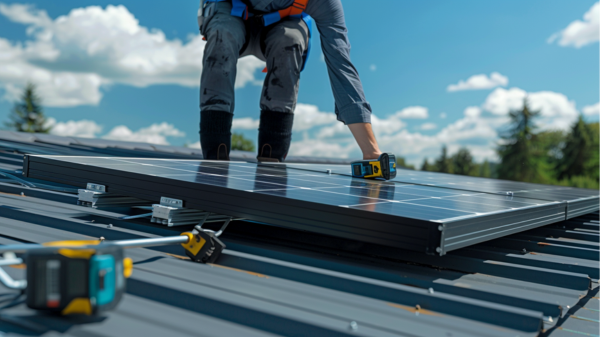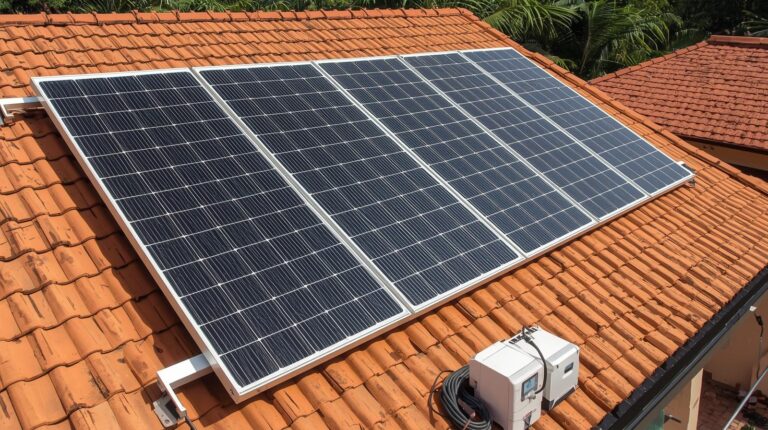In the domain of sustainable energy solutions, solar panel installation emerges as a critical task demanding precision and safety. As the industry evolves, so too does the array of tools required to guarantee efficient and effective installations. We’ll be discussing the best tools for solar panel installation that you should know.
From highly specialized equipment to standard hand tools, the selection of appropriate gear can greatly influence the installation process and the ultimate performance of the solar system. Whether considering the torque accuracy provided by calibrated wrenches or the electrical safety assured by insulated gloves, each tool plays a pivotal role.
Let’s explore some of the indispensable tools that professionals and enthusiasts alike consider essential for installing solar panels.
Key Takeaways
- Battery Operated Drill: Essential for secure mounting of panels and hardware.
- Digital Multimeter: Key for monitoring power output and system performance.
- Solar Panel Hangers: Ensure safe positioning and optimal energy capture.
- Wire Stripper/Cutter: Crucial for making clean electrical connections.
- PV Testers: Important for evaluating and ensuring panel power output efficiency.
Understanding Solar Panel Systems
Solar panel systems, integral to harvesting solar energy, primarily comprise photovoltaic cells organized in modules to facilitate the photovoltaic effect. These systems are designed to maximize energy capture and conversion efficiency, catering to varying energy consumption demands across different installation contexts.
For solar panel installers, understanding the nuances of grid-tied, off-grid, and hybrid systems is essential. Each system type uniquely influences how energy is consumed and stored, with hybrid systems integrating battery storage for enhanced energy independence. The inclusion of eco-friendly materials in some high-efficiency solar panels not only supports environmental sustainability but also aids in maintaining system efficiency over time.
The resilience of these systems is marked by minimal efficiency degradation, typically around 1-2% annually. This slow rate guarantees that the systems maintain significant operational efficiency over many years, making solar energy a robust choice for sustainable power generation.
Installers must consider the specific racking systems and solar inverters that best fit the environmental and structural demands of each location. Residential setups, for example, might prioritize compact, highly efficient panels with reliable battery storage to counter inconsistent sunlight availability.
Key Components of Installations
To guarantee maximum functionality and energy efficiency, a thorough understanding of the key components of solar panel installations is essential. Solar panel systems are sophisticate assemblies where each component plays a critical role in energy generation and system efficiency.
For solar panel installers, knowledge of these parts not only aids in enhanced installation but also in maintaining long-term reliability and performance. Solar panels, primarily made of crystalline silicon, harness sunlight and convert it into electricity through the photovoltaic effect.
The solar inverter transforms this generated DC power into AC power, suitable for home and business use. Solar racking systems support the panels, guaranteeing they are securely mounted and strategically angled to capture maximum sunlight.
Additionally, the choice between grid-tied solar systems, off-grid setups, or hybrid solar systems impacts installation strategies and equipment needs. Effective solar performance monitoring tools are indispensable for tracking energy production and diagnosing any operational hitches, thereby sustaining peak performance.
Here’s a quick overview of these components:
| Component | Function |
|---|---|
| Solar Panels | Convert sunlight to electricity |
| Solar Inverter | Converts DC electricity to AC electricity |
| Solar Racking | Supports and positions solar panels |
| Hybrid Systems | Combines solar panels with battery storage |
| Performance Monitoring | Tracks energy production and system health |
Understanding these components guarantees that installing solar panels leads to successful energy liberation and sustainability.
Top Essential Installation Tools
After covering the key components necessary for the functionality and efficiency of solar panel systems, attention must now turn towards the tools that facilitate their installation.
Professional solar panel installers understand that the right tools not only streamline the workflow but greatly enhance installation accuracy and guarantee the enduring performance of solar energy systems.
A Battery Operated Drill is indispensable in the toolkit of any installer. Its portability and power are essential for securely mounting panels and other hardware without the limitations and hazards associated with corded tools.
Meanwhile, Digital Multimeters play a significant role in monitoring the power quality of the solar panels. These devices confirm that electrical flow and system performance are up to standard, which is crucial for both installation and maintenance.
Solar Panel Hangers are specifically support the safe and precise positioning of panels on mounting rails, important for ideal energy capture and reducing the risk of damage.
For electrical connections, no tool is more necessary than a Wire Stripper/Cutter, which guarantees clean cuts and proper insulation removal. Understanding the importance of proper installation and maintenance is essential as it directly impacts the efficiency and lifespan of the solar power system.
Lastly, PV Testers are fundamental for evaluating the power output and quality emitted by the panels, facilitating effective troubleshooting and compliance with energy standards.
Safety Equipment for Installers
Guaranteeing the safety of solar panel installers is paramount, especially when working at elevated heights where the risk of falls is significant. Utilizing fall protection equipment such as harnesses and safety ropes can drastically reduce the incidence of accidents. These tools are not just add-ons but essential components that guarantee compliance with stringent safety regulations, protecting both the novice and the experienced worker.
Helmets, another vital piece of safety equipment, guard against head injuries from falls or unexpected debris during installation. The dynamic environment of solar panel installation calls for robust protective gear to shield installers from common occupational hazards.
Additionally, as highlighted in comprehensive services, regular safety audits and equipment checks are essential to maintaining high standards of safety and efficiency on-site.
Moreover, thorough training in safety protocols and emergency response is indispensable. Installation teams must be well-versed in handling crises effectively, which underscores the importance of regular safety drills.
These drills reinforce best practices and guarantee that every team member is familiar with the procedures to follow in case of an emergency.
DIY Solar Tool Essentials
For those commencing on the DIY installation of solar panels, certain tools are indispensable for guaranteeing a smooth and efficient setup process. A digital multimeter, a significant tool for solar panel installers, enables the accurate measurement of the quality of power output and overall system health. This multifaceted device combines the functionalities of an ohmmeter, ammeter, and voltmeter, which are essential for maintenance and post-installation checks.
Next, a battery operated drill offers the freedom needed when installing the solar panels on rooftops. Its cordless design enhances safety by mitigating the risk of tripping, necessary for a seamless installation process.
To accompany this, a hack saw is invaluable. Used for cutting the mounting rails to precise lengths, it guarantees that the structure supporting the solar panels is perfectly adjusted to your specific roof layout. Additionally, using a caulk gun is essential for applying sealant during the installation, guaranteeing waterproofing around mounts and flashing which is critical for the longevity and effectiveness of your solar system.
Moreover, a flat pry bar is instrumental for gently lifting shingles to place the flashing beneath, a step significant for the secure and weather-resistant mounting of panels.
Professional Tool Kit Features
Shifting from basic DIY tools to a professional solar panel installation toolkit greatly enhances the precision and efficiency of the installation process. The cornerstone of any proficient solar panel installer’s arsenal is a thorough professional tool kit tailored to meet the rigorous demands of modern solar system setups.
A pivotal component in such a kit is the 23-piece 3/8 Pass-Thru SAE/Metric Socket Set, designed for heightened efficiency and adaptability across diverse installation scenarios.
Equally vital is the compact conduit bender, a tool that empowers installers to manipulate conduit sizes on-site, ensuring safe and orderly management of electrical wiring.
The inclusion of cushion grip Klein nutdrivers, ranging from 3/16 to 1/2, is indispensable. These tools provide secure fastening of various solar components, mitigating the risk of loose connections that could compromise the solar system’s integrity.
Furthermore, specialized tools like the MC3 and MC4 stripper, wrench, and crimper sets are essential for executing precise wiring repairs, safeguarding the system’s long-term efficacy.
Recognizing the importance of solar panel efficiency, it’s essential to use tools that align with the latest technology standards, ensuring that installation is compatible with high-efficiency solar panels.
Advanced Tools and Accessories
To further enhance the efficiency and precision of solar panel installations, advanced tools and accessories are indispensable. The Fluke IRR1 Solar Irradiance Meter is a vital device for solar panel installers, as it measures solar performance by evaluating irradiance levels. This guarantees panels are positioned to capture maximum sunlight, a key factor in optimizing renewable energy yield.
Additionally, the Fluke BT521 Advanced Battery Analyzer plays a pivotal role in maintaining system integrity by checking battery health, essential for sustained energy storage.
A 10-in-1 Klein versatile screwdriver exemplifies the kind of multipurpose tool that streamlines solar installation. This single tool adapts to various screw sizes and types, greatly reducing the need for carrying an excessive number of tools.
Similarly, the 8 pc. ratcheting wrench set enhances workflow by facilitating quicker and more effective tightening and loosening of hardware, speeding up the installation process.
Moreover, the use of a compact conduit bender allows for precise on-site adjustments to EMT conduits, safeguarding electrical wiring and enhancing the aesthetic of the installation.
Each of these tools contributes greatly to the efficiency and reliability of establishing solar systems, reinforcing the indispensable nature of advanced tools in the field of renewable energy.
Diverse Tool Case Options
Diving into the domain of tool case options, solar panel installers find an array of nine distinct configurations that cater to diverse needs such as portability and systematic organization.
These options range from highly portable rolling tool bags to more stationary, rugged cases designed for long-term durability. Brands like ToughBuilt and VETO PRO PAC lead the market, offering solutions that embody both convenience and reliability. These rolling tool bags enable professionals to effortlessly transport their tools across varied installation sites, adapting swiftly to the demanding environments of solar panel installation.
Moreover, each tool case has been meticulously designed to house tools from premier USA and European brands, guaranteeing that quality and reliability are never compromised. The integration of custom tool kit options further enhances this experience, allowing installers to personalize their tool selection to align perfectly with specific project demands and organizational preferences.
Adding to the appeal, every tool case comes backed with a lifetime warranty, emphasizing the manufacturers’ commitment to durability and long-term value.
This assurance of quality, combined with the practical design of professional tools, guarantees that installers are equipped for efficiency and success in the dynamic field of solar panel installation.
Training and Industry Insights
In the domain of solar panel installation, we can not overstate the importance of formal training programs. These programs are pivotal in guaranteeing that solar installers are proficient with the latest industry standards and technologies.
As the solar sector evolves, standardized training programs adapt, enhancing safety and compliance. This is crucial for maintaining the integrity and efficacy of solar installations.
Training encompasses detailed safety protocols, including the proper use of personal protective equipment (PPE) and emergency response techniques, which safeguard installers against occupational hazards.
Industry insights confirm the critical role of continuous education in elevating installer expertise and operational efficiency, which in turn boosts customer satisfaction and trust in solar solutions.
Moreover, hands-on experience with solar-specific tools within these training modules is indispensable.
It guarantees that installers are not only familiar but also proficient in utilizing advanced tools and technologies that drive compliance and quality in solar panel installations.
Such practical exposure is essential for mastering the skills needed to execute high-standard solar projects efficiently.
Related Post: 15 Best Books on Solar Energy: A Comprehensive Guide for Renewable Energy Enthusiasts.
Conclusion
To sum up, the efficacy of solar panel installation hinges on the utilization of appropriate tools and equipment. From battery-operated drills and digital multimeters to specialized wiring tools and safety gear, each component plays a pivotal role in ensuring efficient and safe installations.
Advanced tools like irradiance meters further refine the installation process. An all-encompassing tool case, tailored to individual needs, combined with ongoing training, greatly enhances the proficiency and safety of solar panel installers in this rapidly evolving industry.




